We prepare banku with Hannah on Sunday morning while the church songs can be heard all around. My plan is to head in the afternoon for the lake Bosomtwe. With the large quantity of banku we prepared, I leave with a full stomach and another banku ball on my rear rack, a real big one.
Magazine area in the north of Kumasi is called the biggest automobile workshop of Africa. It is where I leave Selasi to get out of Kumasi.
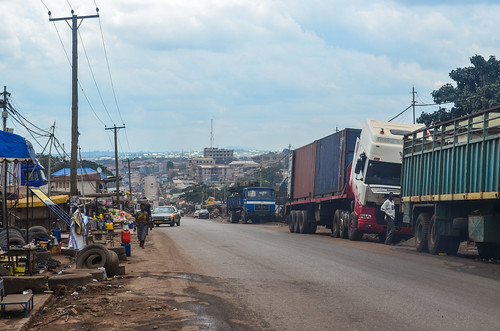
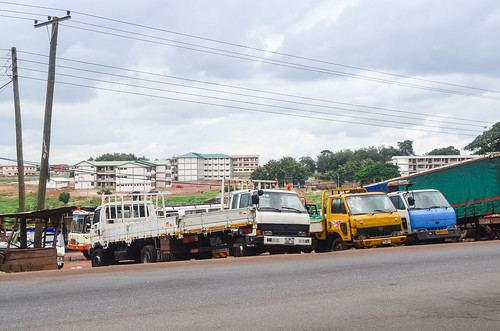
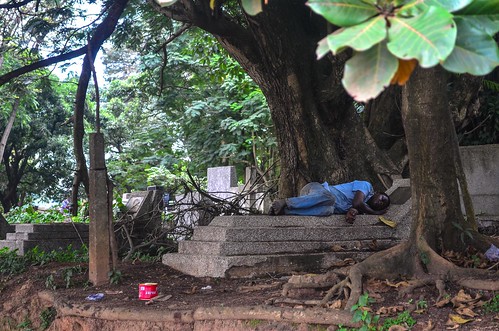
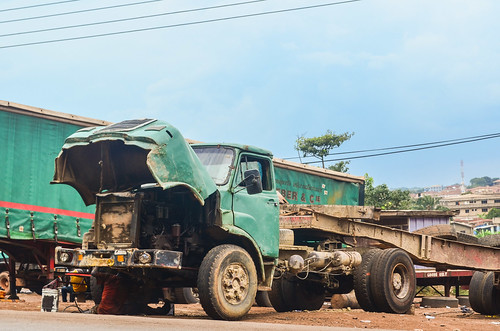
I have to cross Kumasi from north to south, and having seen how terrible is the struggle to go through the city, especially in Kejetia, I am glad being a Sunday will make the traffic lighter. And I pick the eastern bypass road to go relatively quickly until the Nkrumah university and continue onto the lake road. It works pretty well, except that I got my Ghanaian flag stolen in the traffic.
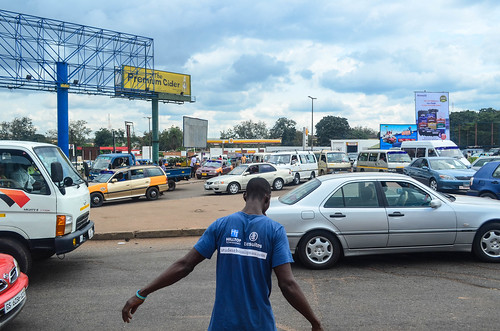
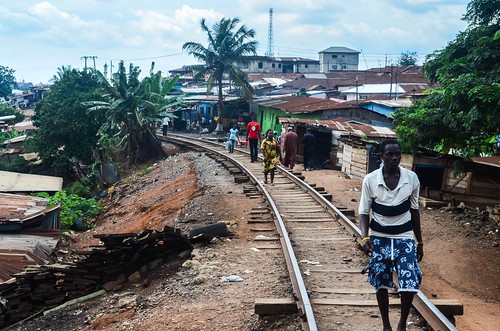
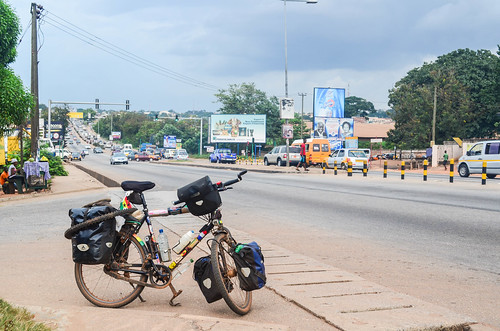
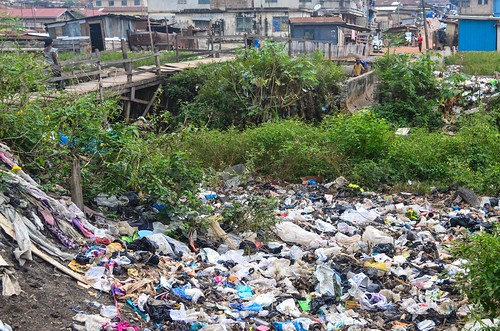
The road to the lake is rainy and uninteresting, with still quite some traffic.
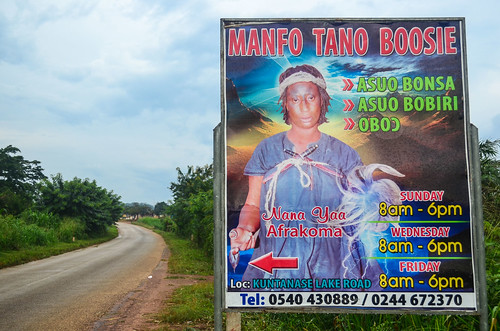
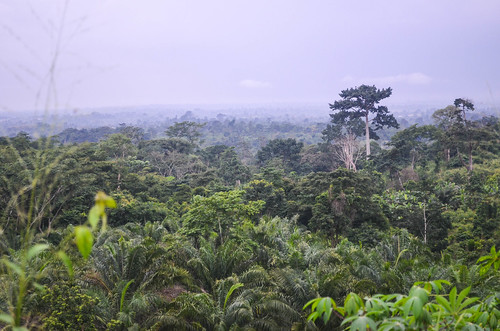
There is supposed to be a 2 GHC fee for foreigners but no one is at the entrance booth. There is only one paved road going to the lake. Because the lake Bosomtwe (Bosumtwi) is actually filling a meteorite crater formed 1 million years ago, it is almost perfectly circular (diameter 8 km) and surrounded by a small mountain barrier.
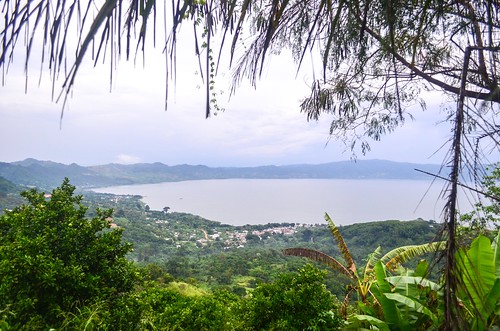
That is why one has to climb up and down to reach the lake shore. The crater is 380 m deep and the lake is up to 80 m deep. It is a sacred lake for the Ashanti, with a legend coming along.
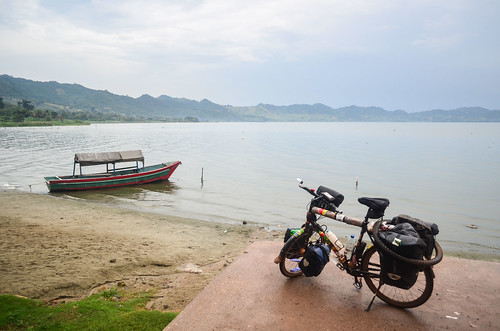
The lake shore has hotels and attracts tourists. I have seen the first tourists in a very long time in Kumasi. I guess they are the reason why the first kids I meet by the lake are standing next to food stands, eating cookies, and telling me with big smiles “I’m hungry give me money“.
I escape this spoiled town to take the small path encircling the lake. It is suitable only for 4×4 and is sometimes a pain on the bicycle. There is a remote guesthouse by the shore that makes a good stop to make laundry and rest, even if the tourism brings higher prices too.
I had found dry fishes on the path and the guesthouse staff prepares for me the spicy sauce that usually goes with the banku. That ball prepared by Hannah is even too big for my dinner.
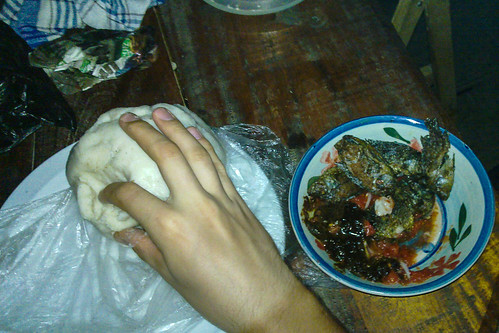
The lake is clean from bilharzia, the parasite that contaminates many African lakes and infects the people who dare taking a swim through freshwater snails.
So I can jump for a morning sacred swim in the sacred lake.

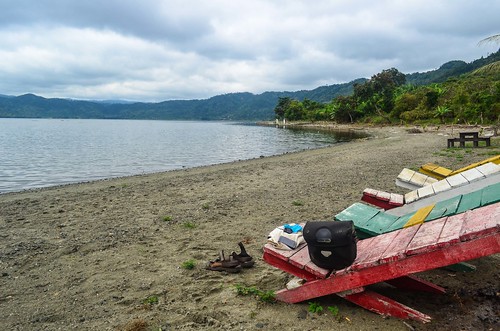
To exit the crater area, I am supposed to take the same road I came from, but I don’t like the idea. My online maps display another route on the other side, and directly on the way to Obuasi. That is perfect, but I am warned that bicycles cannot take it.
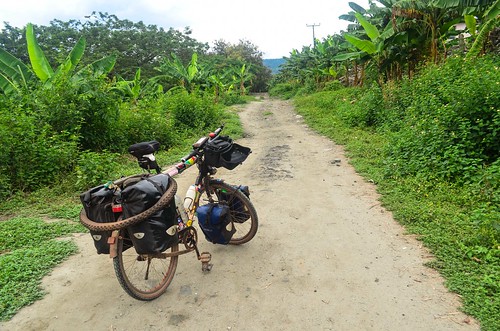
There is no path that a bicycle cannot take. Especially if 4×4 can pass. It doesn’t mean that everything is easy, but everything is at least somehow possible. So I head for it. The several villages bordering the lake seem to have a German sponsor, for toilets, kindergartens, … like if Germany is funding everything around the lake.
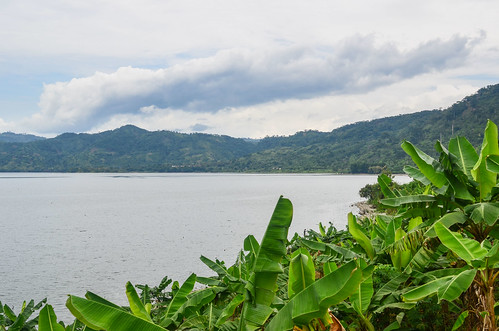
At the point where my path goes uphill to jump over the crater barrier, the road is destroyed by erosion and very steep. There are remains of tar showing that it was an actual road before. But the rocks and the steepness leave me with no choice but to push my bike uphill. It is taking ages, my arms are sore and my shirt uniformly got darker. My forehead is sweating like a dripping tap.
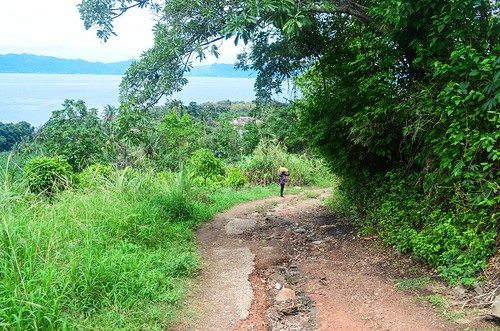
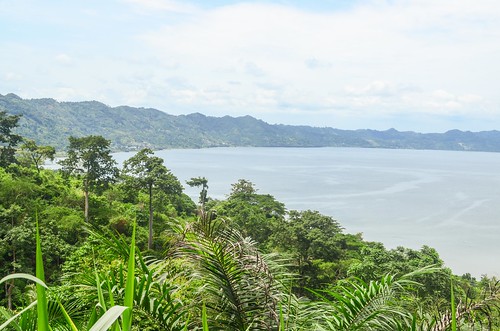
After completing 7 km within 2 hours, I reach the usual Ghana good roads, which are this time a pleasure to find again. I am heading to Obuasi, the city of gold mines.
The alternative to banku is kenkey, a similar thick purée ball, but of maize only. It is much cheaper and much less tasty. My hunger ceases as soon as I see it, but not for long. I look for rice but everyone in the villages selling food on the road have either banku or kenkey. I don’t dislike it, but I wouldn’t mind changing.
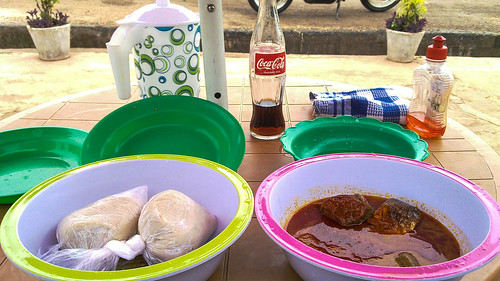
I am now back on one main road link and it has just been rebuilt by the Japanese. The asphalt is as smooth as possible and I get close to Obuasi quite fast.
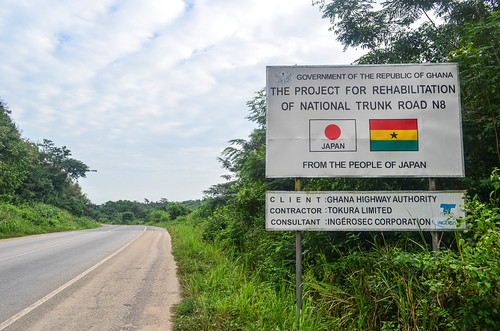
I take a shortcut on an unpaved good road and arrive into Obuasi at sunset time.
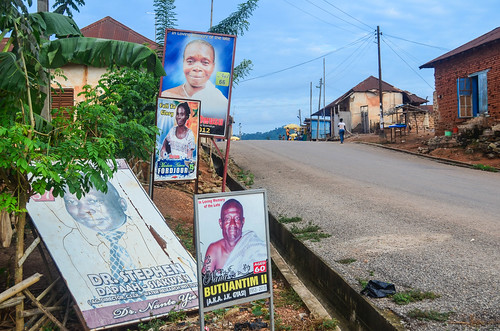
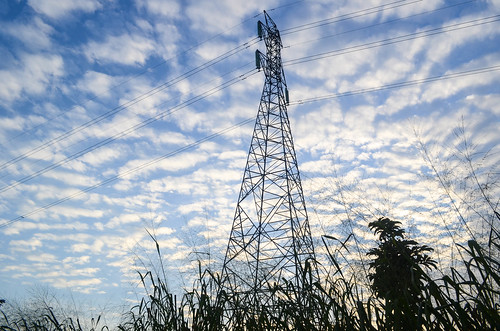
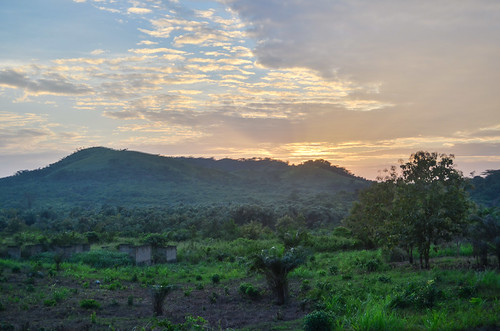

I have then bad luck with finding a place to stay. There are hundreds of churches but almost no signs for guesthouses. There are hotels for people in the mining business that must be quite decent though.
I finally find a correct one, get rice balls for a change of banku, and sleep well. The surface and underground mine tours of the Anglogold Ashanti gold mine, advertised on the internet, are not possible anymore. I will try tomorrow to have a look anyway at what I can get close to.
The satellite view of Obuasi shows many tailing dams. I venture on narrow dirt roads in the hills around the city until one of them, where I am eventually stopped by guards and Anglogold Ashanti workers. They say the whole hilly area around Obuasi is a concession for the mining giant. And that I will be welcome anywhere once I register myself as a visitor to the company reception in town.
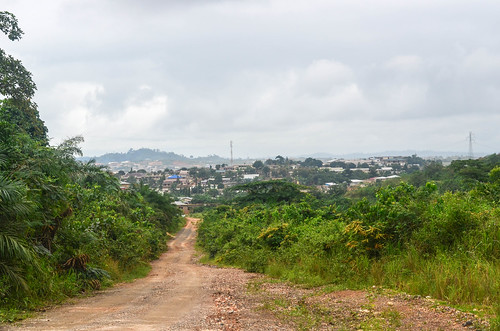
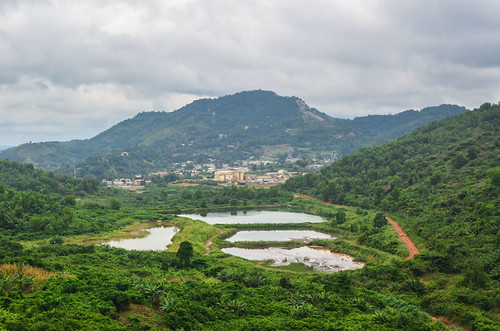
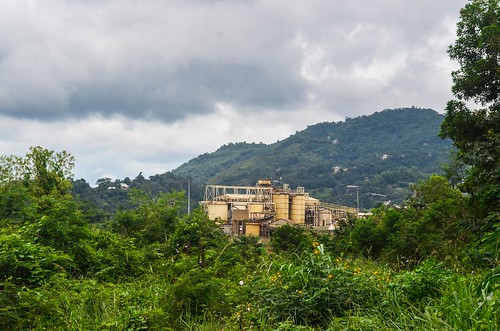
Just behind a plant, there are illegal miners, digging half-naked in the mud with shovels and using small streams to find gold.
The people at the company reception seem to ignore my request and me. It is disappointing to have made the trip to Obuasi in order to see the grandiose works, and having to leave it with almost nothing. As a side note, Anglogold Ashanti was elected world’s Most Irresponsible Company of the year at the Public Eye Awards for its operations in Ghana. Among the contest nominees are present Goldman Sachs, Shell, TEPCO, and Alstom.
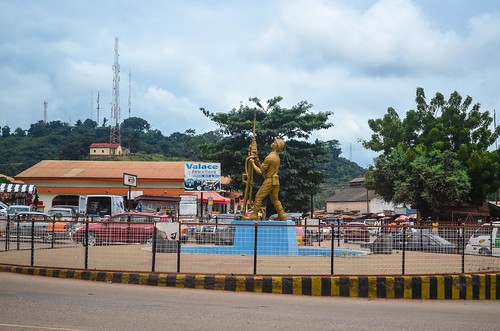
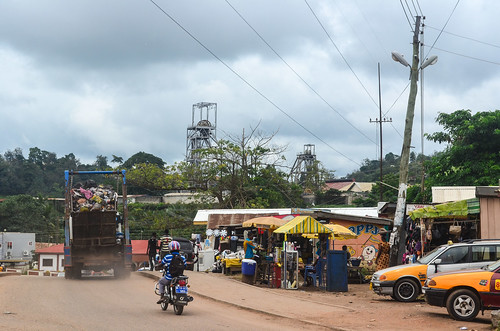
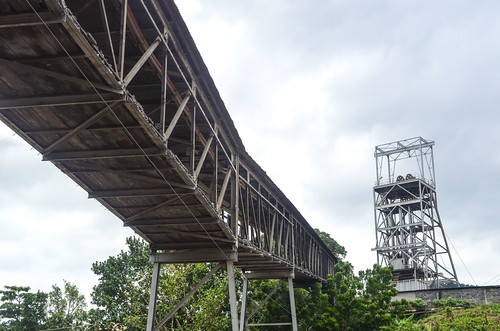
After Obuasi, I head to Accra in order to make visas for the next countries. I pick the smallest road, which is great to cycle.

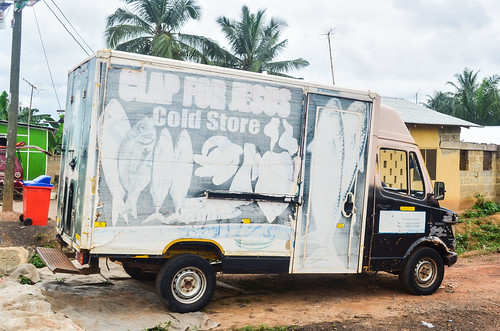
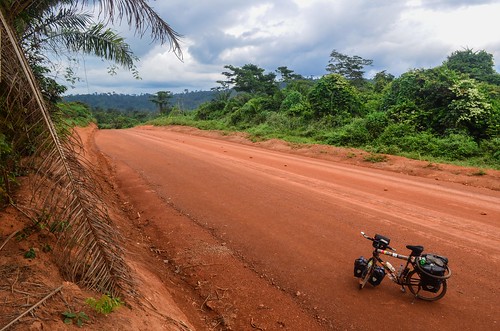
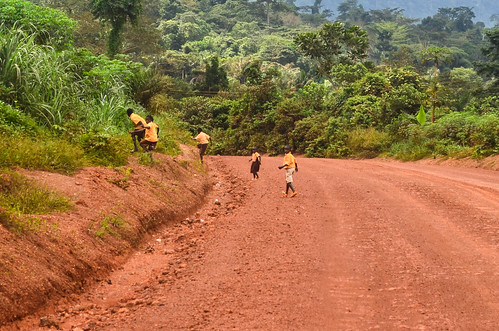
There is one thing that I am annoyed of, here in Ghana. People are calling me more than anywhere else, adults and kids together: “Obroni!“, “broni!“, “eh eh White man!” , “Are you Jesus?“, etc … with nothing more to say. I thought Ghana was one of the leading nations of Africa in terms of education, therefore I didn’t except that much calling and childish behavior, or adults mistaking me for a Chinese. They are just calling me for the sake of calling. If I stop for a chat, people have nothing else to say than “ooooh broni!“. Yes, I know my skin is white, then what? Then nothing. In Ivory Coast, it was a pleasure to chat with everyone about any topic, but here people seem much more shallow. They ask me “Are you Jesus?” or “Are you Osama?” in front of their friends just for fun. They speak directly in my face in Twi and laugh together. There seem to be no interest from their side to start an exchange. Several times, kids and adults in the back of trucks shouted words like “ching chang zu” trying to imitate Chinese. I never faced such an ignorance towards foreign matters (or maybe in Guinea), and this happens in a country supposed to be “better” than its neighbors.
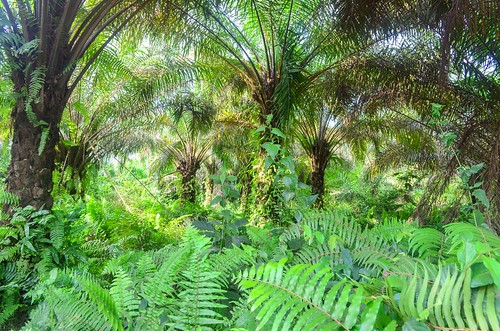
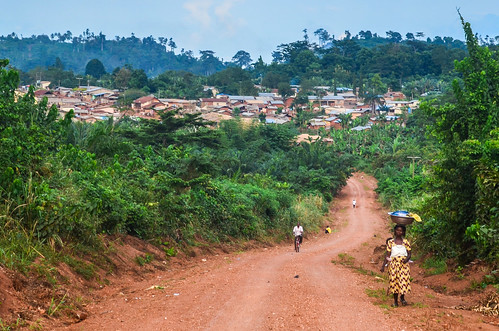
I already passed a couple of villages that have no paved roads and only simple houses, but a huge sound system playing music. It contrasts a lot with the usual quietness of remote villages. Electricity is everywhere, Ghana is definitely a big step ahead of its neighbors.

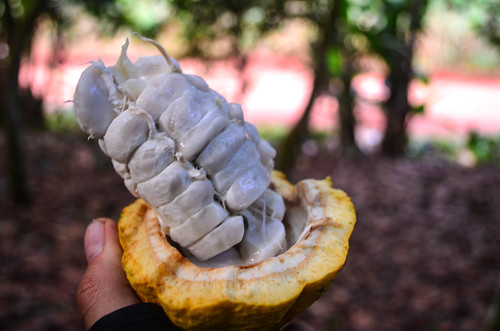
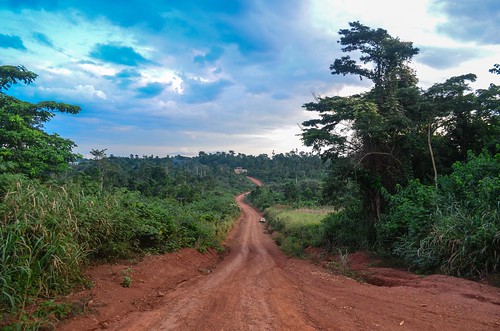
Looking for a bit of quietness, I don’t stop in a village but hide myself in a kassava and banana plantation instead. It is bordering the forest, a bit scary, with the sounds of the animals joining the drums and songs of the next village. I however sleep very well from 8 pm and my tent remains perfectly dry and ants-free in the morning.
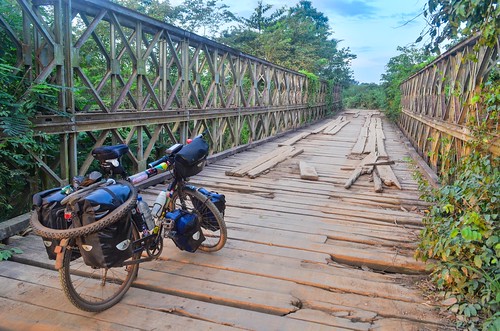







Amazing adventure!